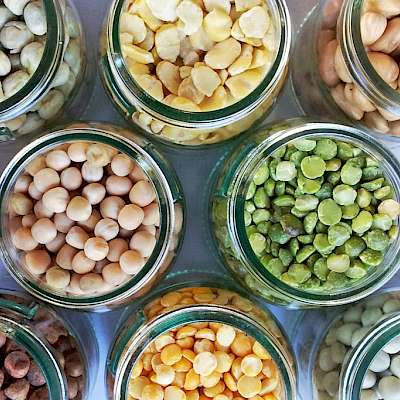The shift towards diets based mostly on plants will drive a huge transformation of the agricultural landscape and supply chains. Local food production needs to transform to deliver food that is healthier and more sustainable and create supply chains that are resistant to shocks, as we have witnessed with the pandemic.
A key aspect of this is growing more plant foods for human consumption in the UK, including vegetables, wholegrains, nuts, seeds, fruit and pulses. Given the need of change and growing public understanding of this, it is crucial that farmers start preparing to meet this demand now and build the infrastructure for future plant production.
One such farmers’ collective that is doing all of that, is Hodmedods. Founded in 2012, Hodmedods is a small but growing independent business, which is harnessing the opportunity to produce and sell more beans and pulses.
Managing Director of Hodmedods, Nick Saltmarsh said: "Hodmedod’s aim is to get more British-grown pulses back into our kitchens. Beans, peas, chickpeas and lentils are fantastic sources of protein and fibre and good for soil, climate and nature, too. Our farmers also grow diverse grains and seeds, from quinoa and chia to emmer and rye - all sustainably grown."
Hodmedods works directly with British farmers to produce and source a range of pulses and grains, with a commitment to providing wholesome quality food that is more sustainably produced. They also grow beans and pulses, which are not only nutritious but also good for the soil and bees. They are helping to turn the tide on the narrow range of arable crops grown and eaten in the UK.
They have recently added lentils to the list of crops they produce which have many advantages both for soil and nutrition. They are a low-input crop for less intensive farming systems - they fix their own nitrogen and suffer few pests and diseases and require less water than many other crops).
The progress being made by Hodmedods, while being sensitive to the limits set by local ecological conditions, shows how farmers can deliver more plant production, by:
- Assessing the suitability of the land for sustainable horticultural production.
- Investing in suitable crop production.
- Focus on soil quality: explore options for soil improvement, such as mixed farming and other ways of returning nutrients to the soil.
- Engage to develop supply chain infrastructure and logistics to support the shipping of larger quantities of plant foods.
For more actions to take towards sustainable production, go to Eating Better’s Better by Half Roadmap, here.
Image credit: Hodmedods
